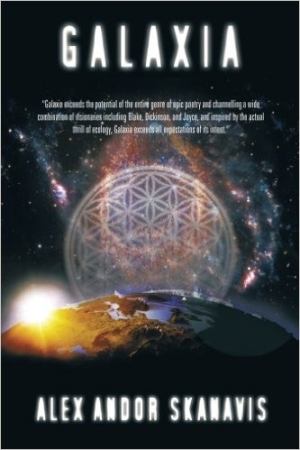Galaxia
Science fiction and transcendental mystery take this epic poem to stellar heights of academic debate.
A bevy of poetic muses and an intelligent strain of mushrooms propel this three-part tribute to Mother Earth. Galaxia, by Alex Andor Skanavis, draws inspiration from James Joyce, Emily Dickinson, and William Blake to create an elaborate, thirty-two-chapter verse that responds to a time-is-of-the-essence dilemma presented in Isaac Asimov’s Foundation series—the need to establish Galaxia.
The mushroom in this story is no ordinary mycelium. Enhanced with special powers, this intelligent fungus is a universal bond, a mystical force that surpasses a religious cleric’s clout. Not intended with a facetious slant—although the concept is humorous to the uninitiated—every line of this technically skilled poetry packs a potent punch:
Toadstool sanctuary spawns refuged homes—
Beneath—tendrils burrow through catacombs—
Above—luminous insects swarm through in droves—
On nightly walk alone, Kreon finds Sacred Grove—
Nothing is funny about ecological damage or global warming. Subtly embedded in these carefully crafted words are contemporary messages and warnings for future generations. Social awareness is at the soul of this time-intensive piece. Though subject to interpretation—as is all literature examined under a scholar’s scrutinizing eye—the twenty-first-century environmental catastrophe that may await us (according to many scientists) is addressed in a symbolic manner in Skanavis’s work, such as this passage that describes the cleansing of the oceanic oasis:
Mycelium now darkened—oil’s absorption—
Metabolized—turns white upon digestion—
Petroleum—quickly deconstructed—
Environment—sanctum uncorrupted—
Every bit as interesting as his theme is Skanavis’s ability to channel several renowned poets. Absorbing a style is no easy feat, yet this innovative author has done a commendable job accomplishing what he set out to do. Joyce, Dickinson, and Blake all make a clandestine appearance in this lovely excerpt:
Orange-shrouded glow directs their attention—
Hallowed grounds to place their mushroom Mecca—
Murals flow—eyeline to cavern’s heights—
Ensuing vivid & enticing sights—
The endeavor’s primary flaw lies in its overwhelming attempt at incorporating the influence of too many famous writers. Even Dante’s The Divine Comedy has loosely inspired the structure, though not the content, of this book. Fascinating, but perhaps too cumbersome, Galaxia veers into fast-paced confusion and occasional incoherence, even though the artistic knowledge behind every line is clearly apparent. Simplicity is often the solution. By paring down the text and narrowing the focus, the desired impact may be more easily achieved.
Skanavis earned a degree in English from the University of Wisconsin–Madison. With likely appeal for an esoteric audience, this admirable undertaking is suited to poetry forums and the college classroom. Science fiction and transcendental mystery take this epic poem to stellar heights of academic debate.
Reviewed by
Julia Ann Charpentier
Disclosure: This article is not an endorsement, but a review. The publisher of this book provided free copies of the book and paid a small fee to have their book reviewed by a professional reviewer. Foreword Reviews and Clarion Reviews make no guarantee that the publisher will receive a positive review. Foreword Magazine, Inc. is disclosing this in accordance with the Federal Trade Commission’s 16 CFR, Part 255.

